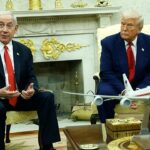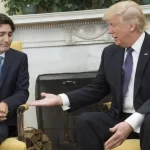China has lashed out at President Donald Trump’s latest tariff threats, calling them “a mistake upon a mistake” as tensions in the global trade war deepen, shaking markets and international diplomacy alike.
Within 48 hours of Trump’s sweeping announcement of increased tariffs on imports from dozens of countries including a staggering 34% duty on all Chinese goods Beijing responded with its own arsenal of economic countermeasures. These include matching tariffs on American imports, trade restrictions targeting specific US companies, and export controls on vital rare earth minerals.
Beijing’s Commerce Ministry issued a scathing statement on Monday, rejecting what it called blackmailing tactics and warning that China will fight to the end if the United States pushes forward. China will never accept it, the statement read. The threat once again exposes the unilateral bullying nature of the US.
On Monday, Trump doubled down, vowing to raise tariffs on Chinese imports by an additional 50% if Beijing doesn’t roll back its retaliatory measures by Tuesday. He also announced he would cancel any requested meetings with Chinese representatives until those tariffs are lifted.
Crisis or Opportunity?
Rather than back down, China appears to be seizing the moment to reposition itself as a global counterweight to the US. A commentary published in the Chinese Communist Party’s flagship newspaper, People’s Daily, described the trade war as a challenge that China is prepared to endure and ultimately benefit from.
The sky won’t fall, the paper said, framing the conflict as proof of China’s economic resilience. The more pressure we get, the stronger we become.
The article praised the institutional advantages of China’s system and pledged that the country would turn crisis into opportunity” under the leadership of President Xi Jinping and the Communist Party.

Analysts believe Beijing’s bold tone is strategic. According to Ryan Hass, a senior fellow at the Brookings Institution, Chinese officials and business leaders increasingly view Trump’s tariff policies not just as a negotiating tactic, but as a miscalculation that could isolate the US globally.
Many Chinesecounterparts have argued the US is making a mistake that will undermine its own global standing,Hass posted on X (formerly Twitter) following a diplomatic visit to China.
Indeed, many US allies appear rattled by the widening scope of Trump’s tariffs, which have already affected key sectors from agriculture to tech to luxury goods. Italy, France, and Japan have all signaled unease, while markets in Asia and Europe have plunged in recent days.
At home, Trump’s policy is drawing both praise and criticism. Some US manufacturers, like steel producers, have welcomed the tariffs as protectionist lifelines. But others particularly in the tech and retail sectors warn of supply chain disruptions and soaring costs.
Meanwhile, protests against Trump’s economic policies and his close ties with controversial figures like Elon Musk erupted in major cities worldwide over the weekend. Demonstrators criticized what they see as un-American approach to global trade, while US lawmakers and business leaders voiced concerns over the long-term economic fallout.
As the world’s two largest economies inch closer to full-scale trade decoupling, the stakes couldn’t be higher. With threats flying on both sides, and no talks currently scheduled, the coming days may determine whether this standoff escalates into an economic cold war or forces a return to the negotiating table.







